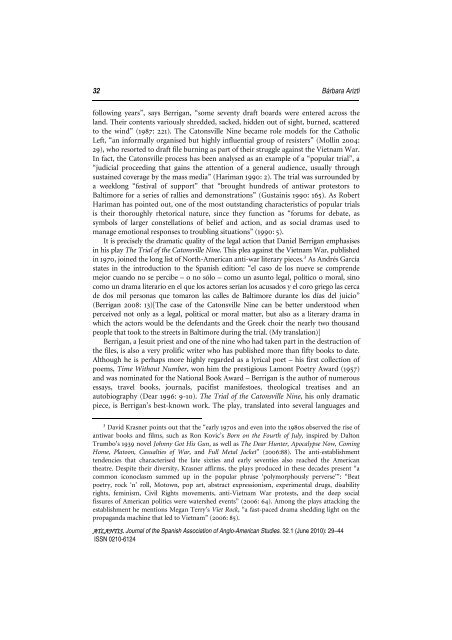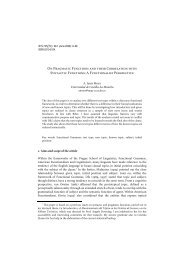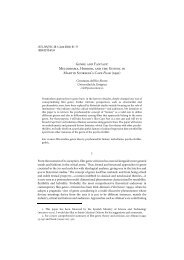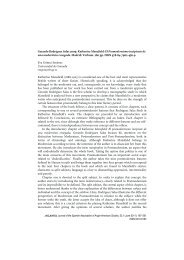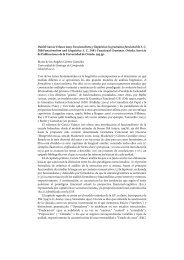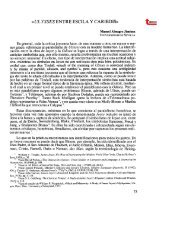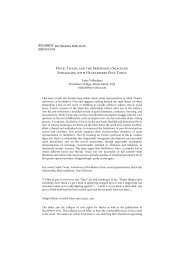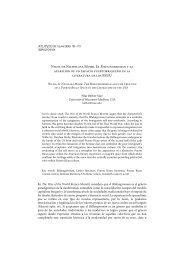Revista de la Asociación Española de Estudios Anglo - Atlantis
Revista de la Asociación Española de Estudios Anglo - Atlantis
Revista de la Asociación Española de Estudios Anglo - Atlantis
Create successful ePaper yourself
Turn your PDF publications into a flip-book with our unique Google optimized e-Paper software.
32 Bárbara Arizti<br />
following years”, says Berrigan, “some seventy draft boards were entered across the<br />
<strong>la</strong>nd. Their contents variously shred<strong>de</strong>d, sacked, hid<strong>de</strong>n out of sight, burned, scattered<br />
to the wind” (1987: 221). The Catonsville Nine became role mo<strong>de</strong>ls for the Catholic<br />
Left, “an informally organised but highly influential group of resisters” (Mollin 2004:<br />
29), who resorted to draft file burning as part of their struggle against the Vietnam War.<br />
In fact, the Catonsville process has been analysed as an example of a “popu<strong>la</strong>r trial”, a<br />
“judicial proceeding that gains the attention of a general audience, usually through<br />
sustained coverage by the mass media” (Hariman 1990: 2). The trial was surroun<strong>de</strong>d by<br />
a weeklong “festival of support” that “brought hundreds of antiwar protestors to<br />
Baltimore for a series of rallies and <strong>de</strong>monstrations” (Gustainis 1990: 165). As Robert<br />
Hariman has pointed out, one of the most outstanding characteristics of popu<strong>la</strong>r trials<br />
is their thoroughly rhetorical nature, since they function as “forums for <strong>de</strong>bate, as<br />
symbols of <strong>la</strong>rger constel<strong>la</strong>tions of belief and action, and as social dramas used to<br />
manage emotional responses to troubling situations” (1990: 5).<br />
It is precisely the dramatic quality of the legal action that Daniel Berrigan emphasises<br />
in his p<strong>la</strong>y The Trial of the Catonsville Nine. This plea against the Vietnam War, published<br />
in 1970, joined the long list of North-American anti-war literary pieces. 3 As Andrés García<br />
states in the introduction to the Spanish edition: “el caso <strong>de</strong> los nueve se compren<strong>de</strong><br />
mejor cuando no se percibe – o no sólo – como un asunto legal, político o moral, sino<br />
como un drama literario en el que los actores serían los acusados y el coro griego <strong>la</strong>s cerca<br />
<strong>de</strong> dos mil personas que tomaron <strong>la</strong>s calles <strong>de</strong> Baltimore durante los días <strong>de</strong>l juicio”<br />
(Berrigan 2008: 13)[The case of the Catonsville Nine can be better un<strong>de</strong>rstood when<br />
perceived not only as a legal, political or moral matter, but also as a literary drama in<br />
which the actors would be the <strong>de</strong>fendants and the Greek choir the nearly two thousand<br />
people that took to the streets in Baltimore during the trial. (My trans<strong>la</strong>tion)]<br />
Berrigan, a Jesuit priest and one of the nine who had taken part in the <strong>de</strong>struction of<br />
the files, is also a very prolific writer who has published more than fifty books to date.<br />
Although he is perhaps more highly regar<strong>de</strong>d as a lyrical poet – his first collection of<br />
poems, Time Without Number, won him the prestigious Lamont Poetry Award (1957)<br />
and was nominated for the National Book Award – Berrigan is the author of numerous<br />
essays, travel books, journals, pacifist manifestoes, theological treatises and an<br />
autobiography (Dear 1996: 9-10). The Trial of the Catonsville Nine, his only dramatic<br />
piece, is Berrigan’s best-known work. The p<strong>la</strong>y, trans<strong>la</strong>ted into several <strong>la</strong>nguages and<br />
3 David Krasner points out that the “early 1970s and even into the 1980s observed the rise of<br />
antiwar books and films, such as Ron Kovic’s Born on the Fourth of July, inspired by Dalton<br />
Trumbo’s 1939 novel Johnny Got His Gun, as well as The Dear Hunter, Apocalypse Now, Coming<br />
Home, P<strong>la</strong>toon, Casualties of War, and Full Metal Jacket” (2006:88). The anti-establishment<br />
ten<strong>de</strong>ncies that characterised the <strong>la</strong>te sixties and early seventies also reached the American<br />
theatre. Despite their diversity, Krasner affirms, the p<strong>la</strong>ys produced in these <strong>de</strong>ca<strong>de</strong>s present “a<br />
common iconoc<strong>la</strong>sm summed up in the popu<strong>la</strong>r phrase ‘polymorphously perverse’”: “Beat<br />
poetry, rock ‘n’ roll, Motown, pop art, abstract expressionism, experimental drugs, disability<br />
rights, feminism, Civil Rights movements, anti-Vietnam War protests, and the <strong>de</strong>ep social<br />
fissures of American politics were watershed events” (2006: 64). Among the p<strong>la</strong>ys attacking the<br />
establishment he mentions Megan Terry’s Viet Rock, “a fast-paced drama shedding light on the<br />
propaganda machine that led to Vietnam” (2006: 85).<br />
ATLANTIS. Journal of the Spanish Association of <strong>Anglo</strong>-American Studies. 32.1 (June 2010): 29–44<br />
ISSN 0210-6124


